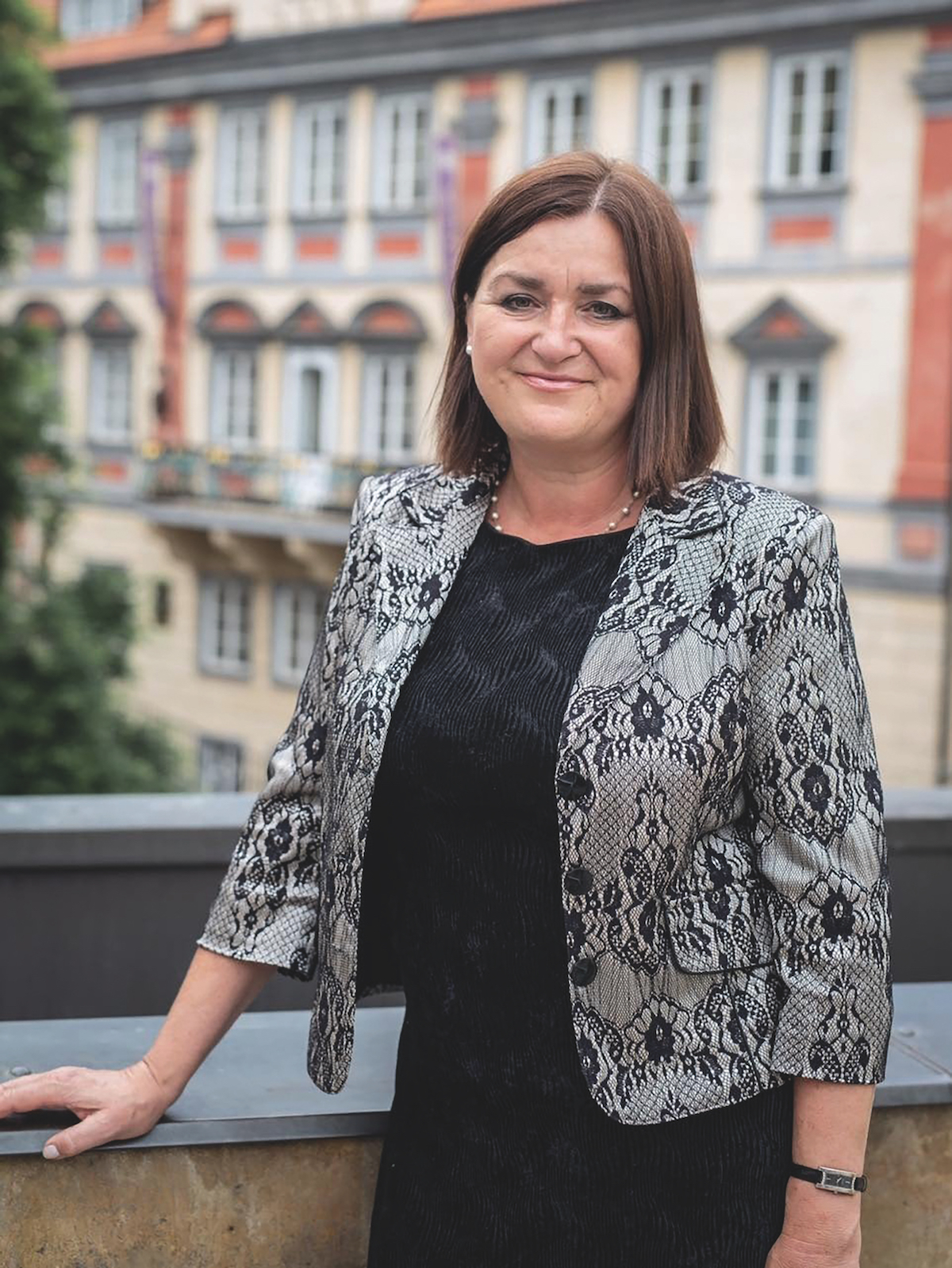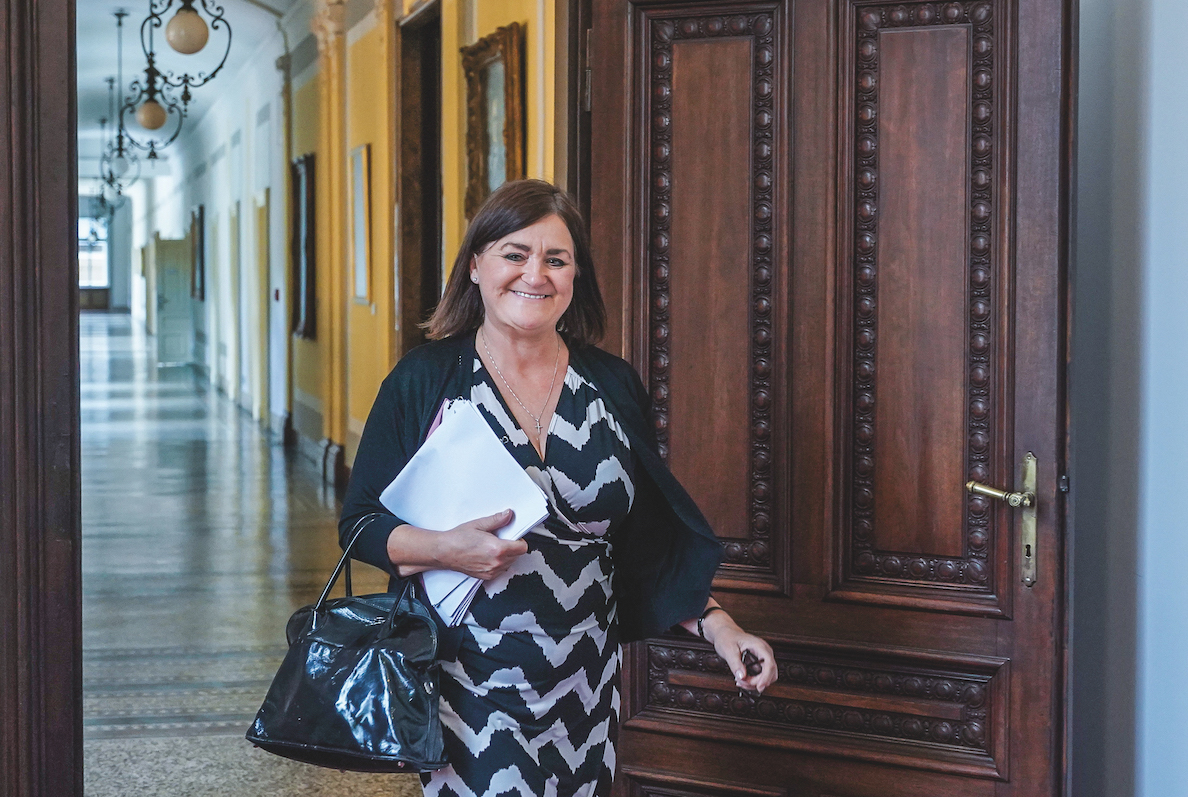“Innovation is the only way forward”

Helena Langšádlová, Minister for Science, Research and Innovation; Photo by: Veronika Rejmanová
Text: Martina Hošková and M. Zisso
Helena Langšádlová became the Minister for Science, Research, and Innovation in December 2021. She has been a Member of the Czech Parliament since 2010, representing the TOP 09 political party. She lives in Černošice, Central Bohemia, where she once served as deputy mayor and mayor. Among other things, we spoke about her responsibilities in the government, how she perceives the concept of innovation, and the limitations of the state’s budget.
What does it mean to be the Minister for Science, Research, and Innovation? What are you in charge of?
First and foremost, the existence of my position is a message from this government that it takes science, research, and innovation seriously. The Czech system of this field’s management is extremely fragmented. Up until now, the coordinating role has been primarily performed by the Government Council for Research, Development, and Innovation, which the Prime Minister most often chaired. However, even with the best effort, the Prime Minister cannot delve deeply into the problems of this area. I have the time and space to do so.
Regarding the day-to-day responsibilities, I would divide them into two parts. The first reflects the government’s agenda. As a member of the government, I naturally have to work on all the substantial issues that we are dealing with – and there are quite a few of them these days. At the same time, my responsibility is to add the perspective of science and research. If we are dealing with the climate and energy crisis, then my natural input is on how science and research can help us, and what we need to do in order to mobilize the capacities (for it); if we are dealing with security issues as a result of Russia’s incursion into Ukraine, I aim to also address the security implications of science and research in relation to authoritarian regimes. The second area of my day-to-day agenda relates to science and research directly: from evaluating research organisations, negotiating the science and research budget, and setting up public support programmes, to preparing legislative changes and communicating those changes within the system.
Can you tell us about your approach to innovation, and how you drive it forwards?
Innovation is a broad concept. On the one hand, there are crucial technological innovations in private companies, where today digitalisation plays an important role. On the other hand, there are for instance innovations in public administration, in its organisation and procedures. We are trying to consider this entire broad area. Innovation in business is the absolute key to the competitiveness of our economy. Today, in the Czech Republic, 60% of all research and innovation funding comes from private sources. It is not bad, but if we want to keep up with the most advanced countries then we need to increase this ratio even further. We often take Israel as an example of one of the most innovative countries in the world. It should be noted, however, that they spend less on science, research, and innovation from public sources in terms of the GDP ratio than we do. It is far more driven by business.
We are working on instruments that should motivate a larger reinvestment in research and innovation, such as tax deductions. We also strive to provide bigger support for start-ups and improve the conditions for knowledge and technology transfer between academia and the corporate world.
Why should we innovate?
Innovation generally means adding value, either through efficiency gains or by creating new value. This in itself is a good reason to innovate. However, the importance of truly significant innovations is elsewhere: they are not isolated improvements. Innovation spills over. If you manage to break through in an area, it can have far-reaching consequences in other areas as well. This is how a competitive economy focused on high-added value is created.
Technology and innovation – are they the same thing?
Innovation is a much wider concept. It can be about processes, and not just in the technological sense. For instance, we can speak about innovative educational methods. I believe education must follow the fundamental changes society is going through, including digitalization. If we do not want to proceed via trial and error, then we need to engage in pedagogical research. This has two essential conditions: that researchers come up with concrete answers to fundamental societal questions, and that policymakers base their policies on these findings. We have reserves in both steps.

Helena Langšádlová, Minister for Science, Research and Innovation; Photo by: Office of the Government of the Czech Republic
How important is innovation in our current situation?
Innovation is important in every situation – it is about the general mindset. Society must tend to move forward. But of course, the challenges we are facing now emphasize the need for new solutions in many areas. We face serious multiple crises. The combination of long-term and unfortunately largely underestimated problems, such as climate change and population ageing, alongside the current sudden crises, particularly the COVID-19 pandemic and the Russian invasion of Ukraine and its consequences, brings really significant uncertainty for the future. Our society needs to pull out all the stops to meet these challenges. I strongly believe that science, research, and innovation have a key role to play in this.
There are many important decisions to be made – not only at the national level, but also at the European and global ones. These decisions are not to be subject to ideologies and pressures from various interest groups: all policies must be consistently based on scientific insights. It sounds simple, but we all know that this is a big task for a public administration, as well as for researchers.
Do you feel you have a sufficient budget to do what is needed?
For one, we should definitely spend more money on science and research. The other thing is that we should spend our resources more efficiently. And we should add a third perspective, which is fiscal consolidation – unfortunately, an inherited huge structural deficit is one of the challenges this current government is facing.
Regarding spending efficiency, we plan to run a project in cooperation with the European Commission and the OECD, aimed at strengthening capacities for deep evaluation and impact assessment of public R&D funding programmes.
What are the biggest challenges you are currently tackling?
We have started a broad discussion on a new set of research priorities. This is important because priorities, to some extent, influence the funding opportunities of research organisations. The beginning of these discussions, however, has already shown how difficult it will be to reach a consensus on these issues. At the moment, we have 170 research priorities, and they are so broad that it is almost impossible to find a topic that does not fit (within them). Our aim is to make sure that those priorities really are priorities.
What I see as a huge challenge is some of the, shall we say, ‘cultural barriers’. We are trying to promote a knowledge transfer in order to assure that academic research does not end up only with publications, but that discoveries are transferred, for instance, through licences into practice, possibly in the form of university spin-off companies. However, we are facing resistance from a significant part of the research community, which sees the publication as the only pure scientific outcome. This is a cultural problem that is difficult to change. But we urgently need to get over it.
The Czech Republic’s second presidency of the EU Council finished in December last year. How was the Ministry involved?
We were actively involved in the negotiations of the new European Chips Act, which we facilitated at the European level with our colleagues from the Ministry of Industry and Trade. We successfully reached an agreement on a general approach. The development and production of (electronic) chips is, of course, a crucial topic, and one of the areas in which we need to fundamentally increase our strategic independence. There are more areas like this, but I believe that if we can make significant progress in one area then it can set up processes for others. In this field, we are also negotiating specific projects to increase chip development capacity in the Czech Republic, whether it is through cooperation with Taiwan or through establishing a chip cluster, linking manufacturing companies with research organisations.
Where do you think the Czech Republic is headed in the next four years?
Let me be optimistic: I see a country with highly inovated companies, an active start-up environment, and strong university-business linkages. A country where policy decisions are based on scientific knowledge. At least, this is the vision I am working towards.

